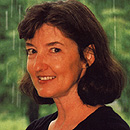Barbara Kingsolver '77 Offers Perspective on Post 9/11 America
September 27, 2001
 September 27, 2001, Greencastle, Ind. - Barbara Kingsolver, the best-selling author of nine books including The Poisonwood Bible, The Bean Trees and Prodigal Summer, and a 1977 graduate of DePauw University is sharing her thoughts about life in America since the events of September 11. This week, two major California newspapers have published two different op-ed pieces by Kingsolver.
September 27, 2001, Greencastle, Ind. - Barbara Kingsolver, the best-selling author of nine books including The Poisonwood Bible, The Bean Trees and Prodigal Summer, and a 1977 graduate of DePauw University is sharing her thoughts about life in America since the events of September 11. This week, two major California newspapers have published two different op-ed pieces by Kingsolver.
The Tuesday, September 25, 2001 edition of the San Francisco Chronicle contains Kingsolver's "And our flag was still there". In the piece, she writes, "my wise husband put a hand on my arm and said, 'You can't let hateful people steal the flag from us.' He didn't mean terrorists, he meant Americans. Like the man in a city near us who went on a rampage crying "I'm an American" as he shot at foreign-born neighbors, killing a gentle Sikh man in a turban and terrifying every brown-skinned person I know." Later, Kingsolver concludes, "Patriotism seems to be falling to whoever claims it loudest, and we're left struggling to find a definition in a clamor of reaction... It occurs to me that my patriotic duty is to recapture my flag from the men now waving it in the name of jingoism and censorship."
You can read the entire text at the Chronicle's web site, by clicking here.
Two days before, a separate piece by Barbara Kingsolver, entitled "A Pure, High Note of Anguish" was published in the Los Angeles Times. There, she writes of the tragedies in New York City and Washington, D.C., "There are so many answers, and none: It is desperately painful to see people die without having done anything to deserve it, and yet this is how lives end nearly always. We get old or we don't, we get cancer, we starve, we are battered, we get on a plane thinking we're going home but never make it. There are blessings and wonders and horrific bad luck and no guarantees. We like to pretend life is different from that, more like a game we can actually win with the right strategy, but it isn't. And, yes, it's the worst thing that's happened, but only this week. Two years ago, an earthquake in Turkey killed 17,000 people in a day, babies and mothers and businessmen, and not one of them did a thing to cause it." Later, she states, "There are a hundred ways to be a good citizen, and one of them is to look finally at the things we don't want to see. In a week of terrifying events, here is one awful, true thing that hasn't much been mentioned: Some people believe our country needed to learn how to hurt in this new way. This is such a large lesson, so hatefully, wrongfully taught, but many people before us have learned honest truths from wrongful deaths."
"A Pure, High Note of Anguish" can also be read, in its entirety, online. You can access the LA Times by clicking here.
Back